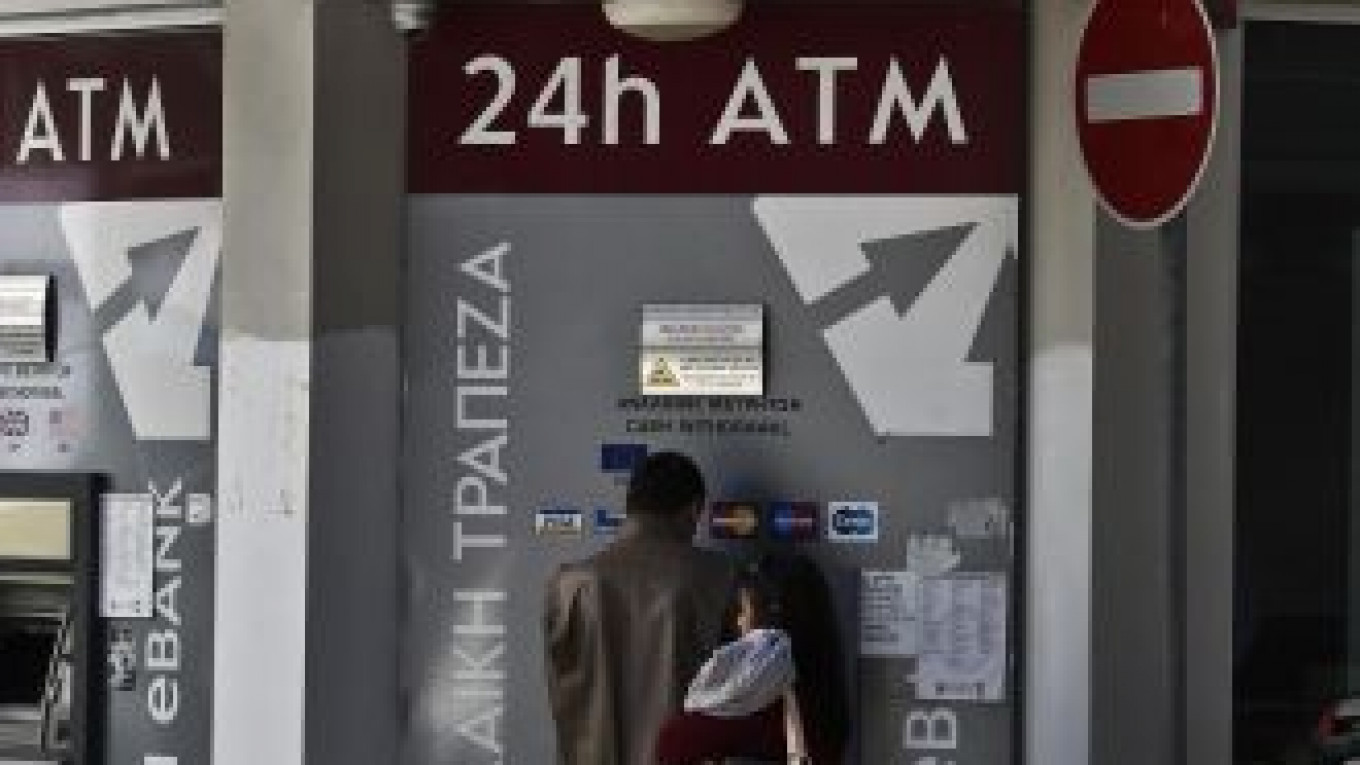A deal between Cyprus and European lenders was backed by the Kremlin on Monday even as top Russian officials unleashed a storm of angry rhetoric about a compulsory levy on local bank accounts included in the rescue package.
President Vladimir Putin "decided to support" the agreement between Cyprus and the European Commission, said his spokesman, Dmitry Peskov.
Russia will begin working on restructuring a 2.5 billion euro ($3.2 billion) loan given to Nicosia in 2011, Peskov added. Renegotiating the loan was a key aim of Cypriot Finance Minister Michalis Sarris when he came to Moscow for talks last week.
While Putin's move appeared to suggest a tentative backing for the deal, other officials were deeply critical.
"They are continuing to steal what has already been stolen," Prime Minister Dmitry Medvedev told a government meeting, Interfax reported.
The phrase echoed Vladimir Lenin and continued a comparison already drawn by Medvedev between the actions of the European Union and Soviet-era expropriations of private property.
As part of Cyprus' 10 billion euro "bail-in" hammered out in the early hours of Monday morning, depositors with over 100,000 euros in Cypriot accounts will be hit hard. The size of the loss is yet to be announced, with media reports suggesting that between 20 and 40 percent could be skimmed off.
Implementation is likely to have a disproportionately heavy impact on Russians, who are estimated to have $19 billion in Cypriot accounts. ?
Banks in Cyprus were closed all last week and remained shut for a public holiday Monday. As part of the deal, the country's two biggest banks, Laiki and the Bank of Cyprus, will be restructured.
"Rescuing someone at the expense of robbing depositors is something new," tweeted Alexei Pushkov, head of the State Duma's International Affairs Committee. "If they 'rescue' like this again, all the money will pour out of Europe — and the European Union will collapse."
Russian businesspeople also said the new plan was both thieving and hypocritical.
"Russian business has been reminded of long-forgotten Soviet times," said Alexander Galushka, co-chairman of business lobby group Delovaya Rossia. "It kills trust in Cyprus' financial system and Europe in general … and shows the double standards of the European Union."
Putin last week labeled the possibility of a compulsory levy on Cypriot accounts "unjust, unprofessional and dangerous," but his position has since appeared to soften.
Peskov, his spokesman, declined to comment to The Moscow Times on whether the Cyprus deal was positive — or not.
Putin has previously called for the "de-offshorization" of the Russian economy, and Deputy Prime Minister Igor Shuvalov said Wednesday that "what is happening is a good signal to those who are ready to transfer their capital to Russian jurisdiction," RIA-Novosti reported.
Nonetheless, the deal was likely to hit relations between Russia and the European Union, according to Arkady Moshes, an expert at the Finnish Institute of International Affairs.
"I don't think that the Russian leadership was fully prepared to see itself ignored in such a downright manner," he said. "The Russian reaction will be negative, and the bilateral relationship will suffer."
Another consequence of the deal between Nicosia and the "troika" of the European Commission, European Central Bank and the International Monetary Fund could be the destruction of Cyprus as an offshore banking destination.
So much Russian money is traditionally channeled through the Mediterranean island that it is the biggest foreign direct investor in Russia, according to the Russian Central Bank.
European officials have suggested that a significant quantity of those flows are generated by corruption and money laundering.
Capital controls likely to be implemented by the Cypriot authorities when banks open later this week could choke off this financial relationship, according to Peter Westin, chief economist at Moscow brokerage Aton.
"If the transit role that Cyprus has been serving is jeopardized, you will have Russians looking for alternatives," he said. "Before Cyprus had beaches and banks, but it will be left with beaches."
Legal firms, businesses and some of Russia's richest men are busy assessing whether they will abandon Cyprus.
Some colleagues were unimpressed by alternative offshore destinations, such as the Netherlands and Latvia, and are likely to stay in Cyprus, said Yekaterina Manskaya, an offshore expert at Cliff Legal Services, but others just want out as fast as possible.
"The word Cyprus will frighten clients," she said.
Contact the author at h.amos@imedia.ru
Related articles:
A Message from The Moscow Times:
Dear readers,
We are facing unprecedented challenges. Russia's Prosecutor General's Office has designated The Moscow Times as an "undesirable" organization, criminalizing our work and putting our staff at risk of prosecution. This follows our earlier unjust labeling as a "foreign agent."
These actions are direct attempts to silence independent journalism in Russia. The authorities claim our work "discredits the decisions of the Russian leadership." We see things differently: we strive to provide accurate, unbiased reporting on Russia.
We, the journalists of The Moscow Times, refuse to be silenced. But to continue our work, we need your help.
Your support, no matter how small, makes a world of difference. If you can, please support us monthly starting from just $2. It's quick to set up, and every contribution makes a significant impact.
By supporting The Moscow Times, you're defending open, independent journalism in the face of repression. Thank you for standing with us.
Remind me later.


